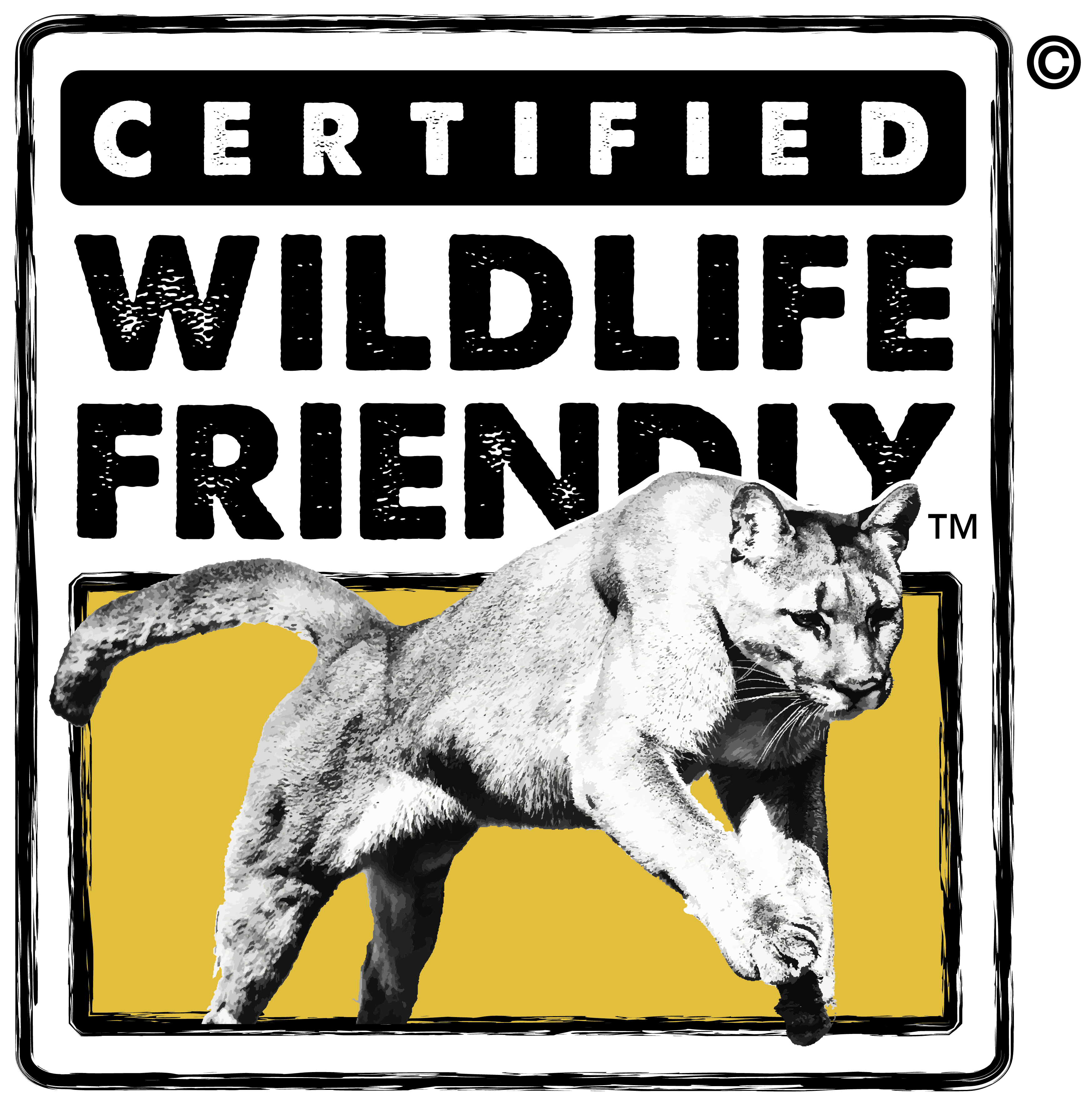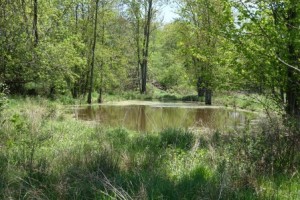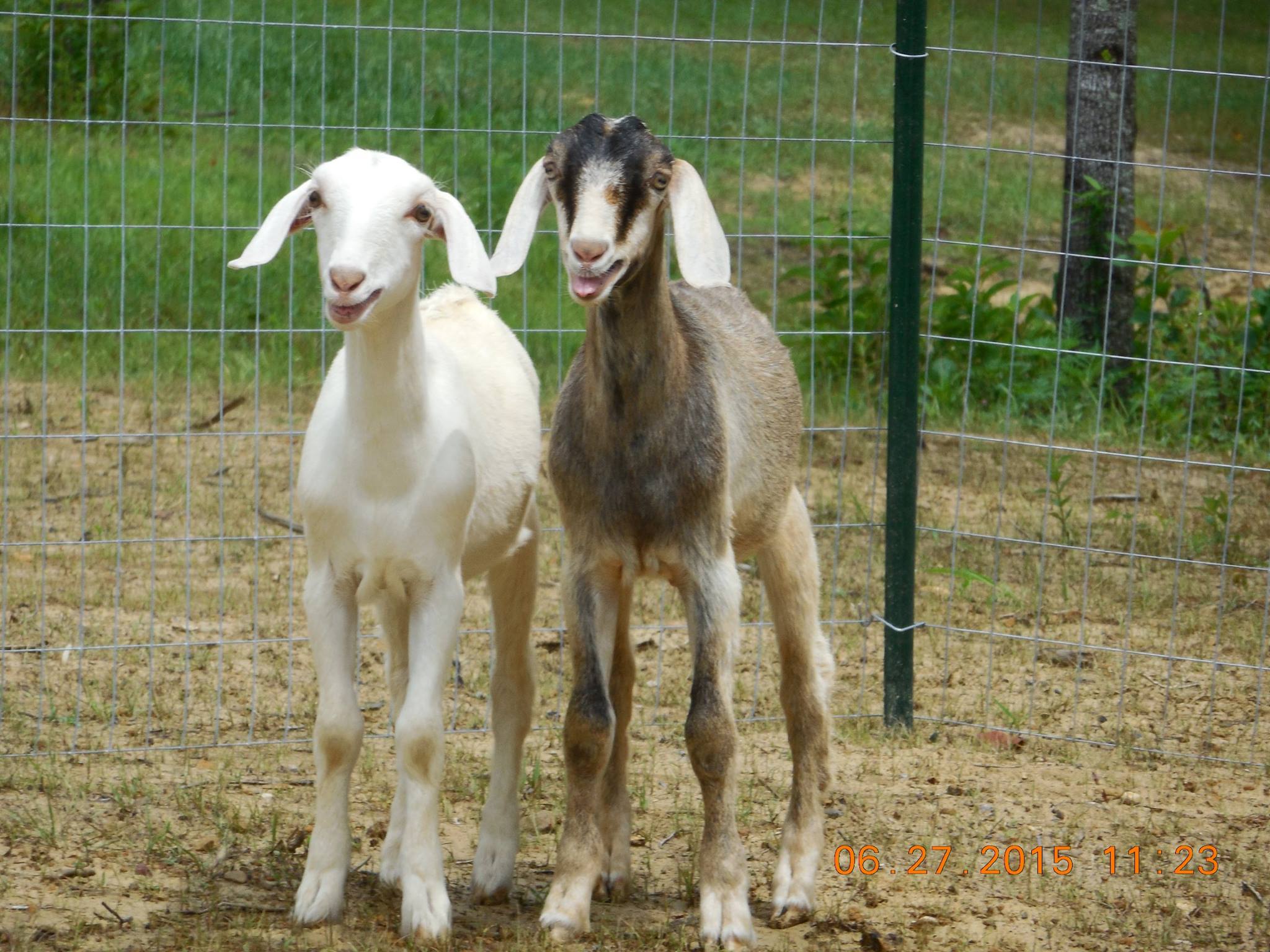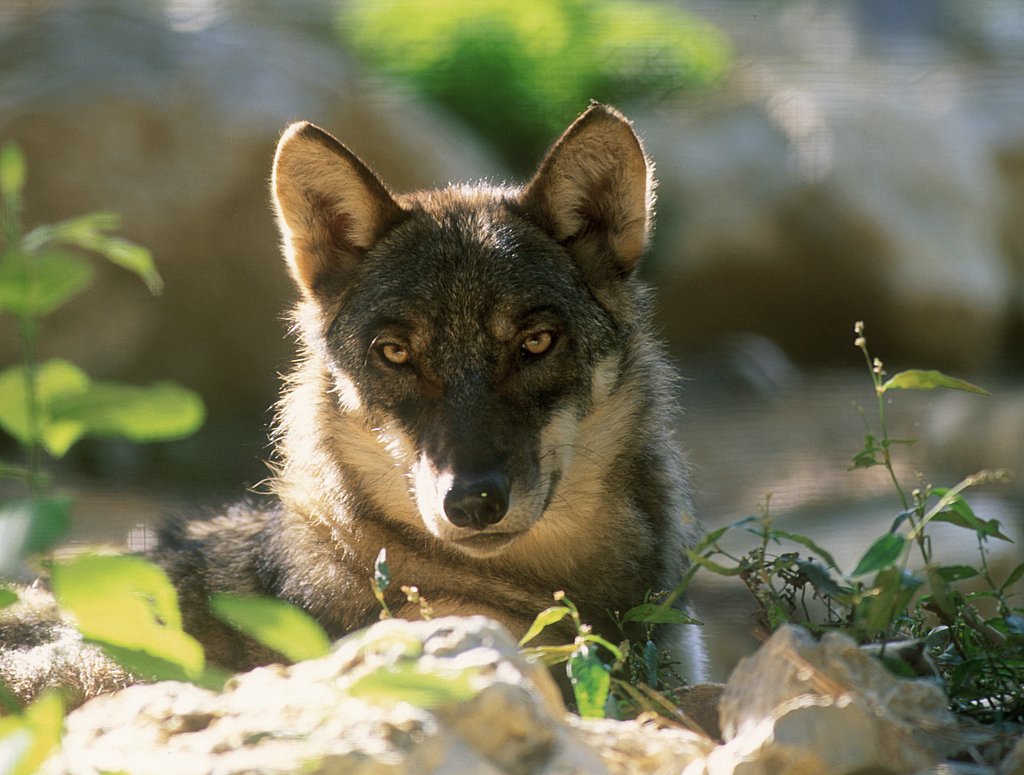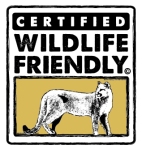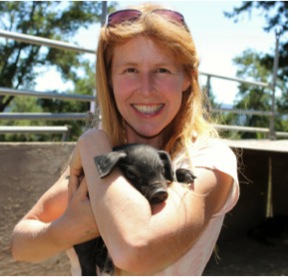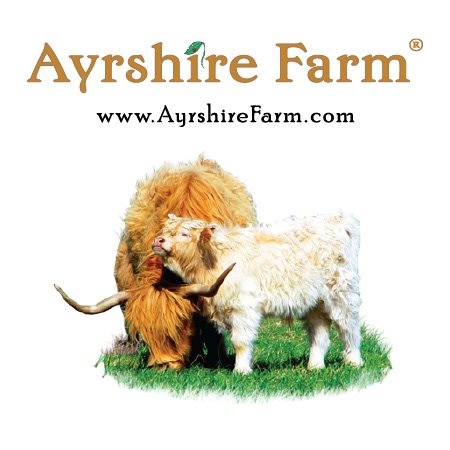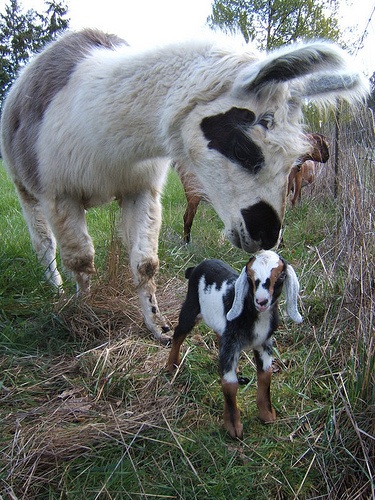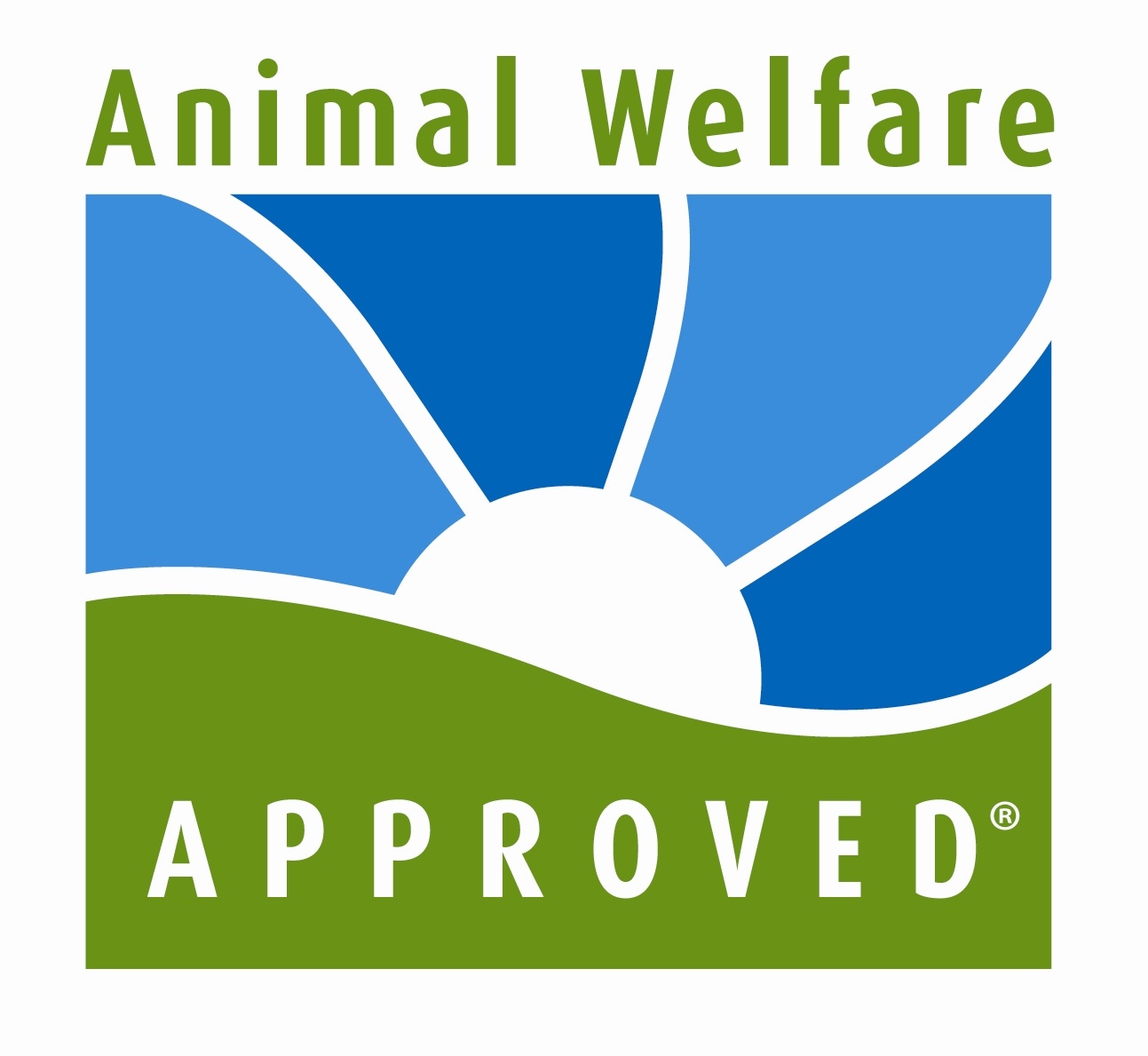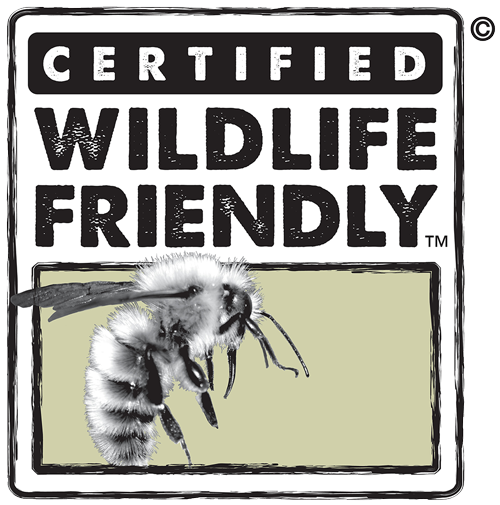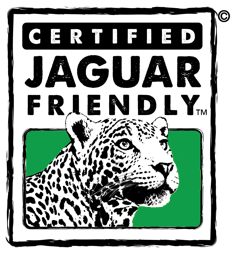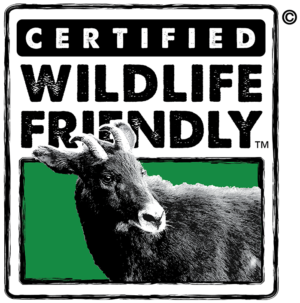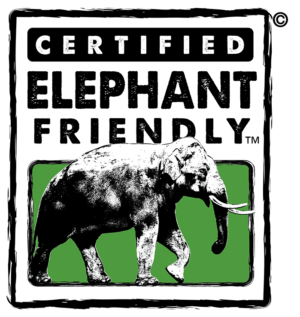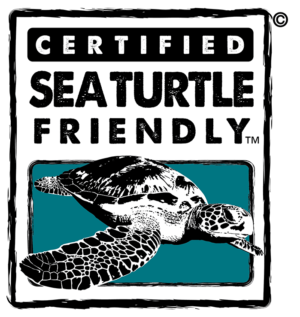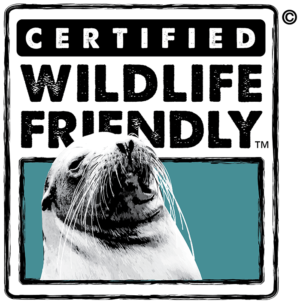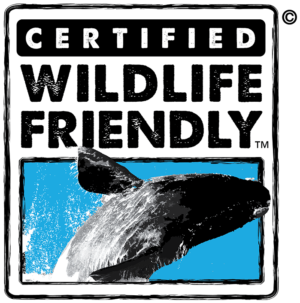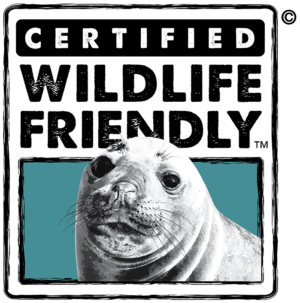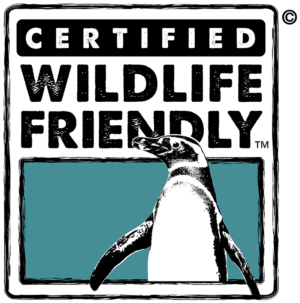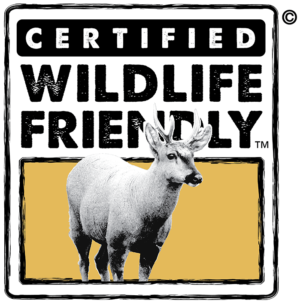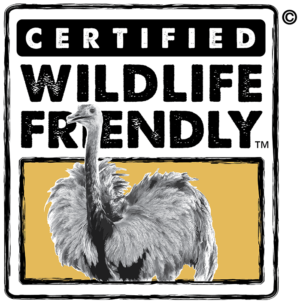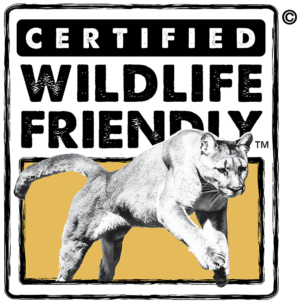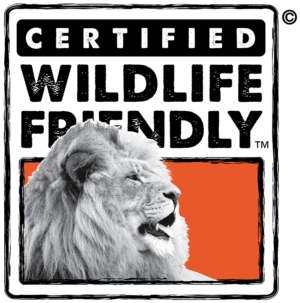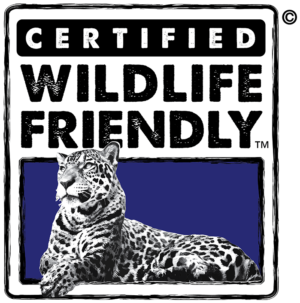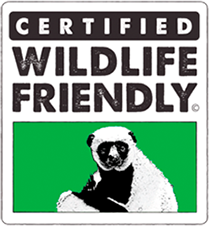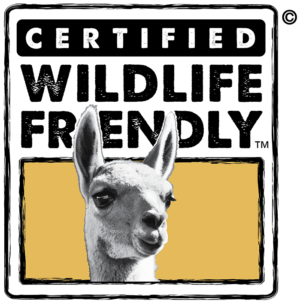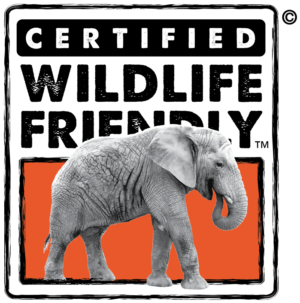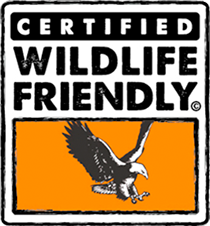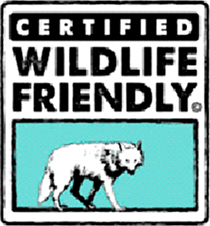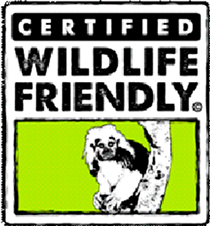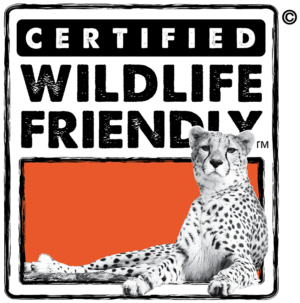Pasturebird First Southern California Farm to Achieve Certified Wildlife Friendly® Status

(c) Primal Pastures
Warner Springs and Murrieta farm raises pastured chickens, rebuilds healthy, regenerative soils and grasslands, and coexists with wildlife.
FOR IMMEDIATE RELEASE
Warner Springs, CA, September 18, 2016 Most people don’t set up a wholesale pastured poultry operation in an area known for its mountain lion activity as much as for its orchards. Yet for farmer Paul Grieve of Pasturebird, flourishing habitat is an integral part of farming. “The important thing to us is that we build an ecosystem. Our role is to steward the land and grow a great environment for Mother Nature.”
On its newest farm site—100 acres of a 1000 acre parcel that meets the Palomar and Iron Spring Mountains in Warner Springs—Paul and his family are restoring a former potato field to permanent pasture. They ensure wildlife corridors remain open and use a variety of methods to protect their chickens, in order that a variety of wildlife can pass through the property. “We end up seeing snakes, rabbits, birds, worms, deer, and coyotes. I love being able to see those guys come through the farm but not interrupt our operations. Knowing that mountain lions are around makes it even better. It means we’re doing something right.”
This sentiment, together with a variety of husbandry practices to meet the farm’s stewardship mission, has enabled Pasturebird and sister location, Primal Pastures, to become Southern California’s first farm to achieve Certified Wildlife Friendly® status. Certified Wildlife Friendly® recognizes farms and ranches committed to regenerative practices that enable wildlife and livestock to coexist. The farm is working to restore perennial grasslands. It uses managed, multi-species grazing practices to improve soil. It conserves wildlife corridors, and relies upon proactive, humane practices to deter predators, among other key attributes. Along with peers around the globe, Pasturebird and Primal Pastures are part of a progressive wave of agriculture that models the critical role of farms and ranches in sustaining wildlife and habitat.
The farm’s efforts have been noticed by the Los Angeles Dodgers and the Lakers, both of which have accounts. “Pasturebird’s commitment to transparency and raising birds the way they were meant to live is truly inspiring,” says chef Alan Latourelle of Wolfgang Puck, another satisfied customer. Kitchen workers from the hospitality group’s Southern California staff recently toured the farm, gaining first-hand experience of what Pasturebird terms simply “real chicken.” Inspired by renowned grass farmer Joel Salatin of Virginia, Paul Greive and his family are committed to creating a scale-alternative to factory farming that cares for the land, the animals and consumers’ health.

(c) Primal Pastures
The farm started simply enough, 5 years ago, from the family’s search for healthy food for its own use: “We were paying a bunch of money for labels, but not good food,” explains Paul. “We wanted to eat meat that was not bad for the environment or our bodies,” he explains. “We couldn’t find what we were looking for.” And, so what began with an order of 54 chickens for personal use turned into a vocation for 2 generations and multiple branches of Paul’s family. Pasturebird, a wholesale operation opened in 2015, builds upon the success of Primal Pastures, the family’s direct-to-consumer farm in Murrieta.
Livestock guardian dogs are integral to the farm’s ability to coexist with wildlife. While predator losses were significant in the farm’s first true commercial year, the family quickly realized the use of lethal control “didn’t jibe at all with what we were doing,” says Paul. Rather, “we were working to “heal the land, heal the soil, and participate with nature.” Today, the farm raises its own Anatolian Shepherd/Great Pyrenees mix guardians. The dogs help to protect the flock, which is moved to fresh pasture daily in open-air, floorless chicken tractors. The farm vision includes having its operations become carbon-neutral in a few years, by offsetting the energy put into tractors and other equipment through its soil building activities.
The farm’s practices mean it is a regional model. Winston Vickers, a veterinarian with the Southern California Mountain Lion Project states: “I am thrilled that Paul and his team are leading the way in the region by taking measures to not only protect their chickens and raise healthier ones, but simultaneously helping to keep wildlife populations and the ecosystems healthy. I applaud their foresight and leadership, and urge others to follow their great example.”
Its efforts mean great food, too. “Seeing chickens that you can tell are happy and healthy is refreshing in this day and age. I never thought I would be so excited about chickens” continues Chef Latourelle. Thank you Pasturebird for what you do, it makes our jobs much easier.”
###
About Pasturebird and Primal Pastures
Primal Pastures (direct to consumer) and Pasturebird (wholesale) farms raise pastured chicken in Southern California. By rotating the chickens to fresh pasture every single day, the farm’s chicken is not only healthy and delicious but also goes beyond sustainability to rebuild healthy, regenerative soils and grasslands.
Instead of using antibiotics to fight disease within the flock, Pasturebird and Primal Pastures use a healthy environment of pasture, sunshine, fresh air, and space to prevent sickness. Instead of marketing vegetarian-fed chicken (chickens are not vegetarians), we want our chickens to eat as many bugs and worms as possible. And instead of hiding our farm from the public, we know that our best marketing is transparency, so we regularly open the ranch for tours and events. For more information, contact Paul Greive via 855-4PASTURE or paul@pasturebird.com and visit www.pasturebird.com and www.primalpastures.com
About Wildlife Friendly Enterprise Network
The Wildlife Friendly Enterprise Network and its Certified Wildlife Friendly® and Predator Friendly® programs represent farmers, ranchers, artisans and conservation heroes from around the world. Participating farms in North America maintain and enhance wildlife habitats and employ a mix of careful observation and proactive practices to allow wildlife and livestock to coexist.
Certified Wildlife Friendly® products contribute to the conservation of over twelve million hectares of diverse wetlands, forests, and grasslands; protect keystone endangered species in North America, Europe, Africa, Asia and Latin America, including wolves, elephants, cheetahs, red pandas and snow leopards, and benefit over 200,000 people through increased food security, income and employment. For more information visit: www.wildlifefriendly.org
Contact:
Paul Greive, Chief Executive Officer
Pasturebird Poultry Company
855-4PASTURE; paul@pasturebird.com
The future Patagonia National Park, Chile, is now Certified Wildlife Friendly™ showcasing flagship coexistence efforts, wildlife conservation and wild lands protection for tourists while supporting the local economy
FOR IMMEDIATE RELEASE
AYSÉN REGION, CHILE: – APRIL-2017– The Wildlife Friendly Enterprise Network (WFEN), a global community dedicated to the development and promotion of products and tourism that contribute to the conservation of threatened wildlife and to the economic vitality of rural landscapes, is pleased to announce the awarding of Wildlife Friendly™ Certification to Patagonia Park, part of Conservacion Patagonica whose mission is to promote the creation of national parks in Patagonia (Argentina and Chile), in collaboration with neighboring communities and local, regional, and national governments, that save and restore wildlands and wildlife, inspire care for the natural world, and generate healthy economic opportunities for local communities.
Originally one of the region’s largest sheep ranches, Estancia Valle Chacabuco changed ownership several times over the past century, resulting in an overgrazed and degraded landscape. When Kris and Doug Tompkins first visited the Valle Chacabuco Valley in 1995, CONAF (Chile’s National Forest Service) had long recognized the need to prioritize the protection of these unique and biodiverse ecosystems. With help from Tompkins Conservation and Conservacion Patagonica, the 170,500-acre Estancia Chacabuco was acquired. In subsequent years several other adjacent properties have been purchased from willing sellers, bringing the currently total area of protected land to close to 200,000 acres. Eventually, Patagonia Park will be combined with the Jeinimeni National Reserve to the north and the Tamango National Reserve to the south, to create a 640,000-acre Patagonia National Park. This will allow bi-national trans-boundary access across the border of Chile and Argentina and will provide ecosystem continuity, wildlife corridors, and tourist driving and hiking circuits.
“For Conservación Patagonica it is an honour to receive the Wildlife Friendly™ Certification in Chile which is a 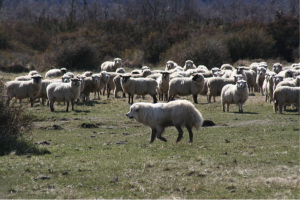
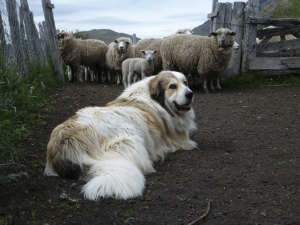
Efforts at Patagonia Park include extensive grasslands restoration, removal of over 400 miles of fencing which fragmented critical habitat by blocking wildlife corridors and entangling species like Guanacos in barbed wire leading to mortality. There is also an endangered Huemul Deer recovery program, a breeding center for Darwin’s Rheas, an Andean Condor reintroduction effort, and Puma monitoring, as well as a thriving livestock guard dog program to protect livestock from predation.
Patagonia Park is an initiative led by Conservación Patagonica since 2004, whose main goal throughout has been the formal donation of the land to the Chilean State to create Patagonia National Park, an agreement which was finalized and signed by the Chilean President President Michelle Bachelet on March 15 2017.
“The need for people and wildlife to not only coexist but to benefit each other is a challenge for protected areas and neighboring lands and communities,” said Cristián Saucedo, Conservation Director. At Conservación Patagónica, we believe this, and we invite other Chilean initiatives to be part of the Wildlife Friendly Enterprise Network, because we see this as a unique opportunity which links tourism, conservation, local communities and caring for the land as all part of our long- term vision for wild lands in Chile.”
###
About Wildlife Friendly Enterprise Network
WFEN and its certification programs represent grassroots farmers, ranchers, artisans, indigenous peoples and conservation heroes from around the world including two World Bank Development Marketplace Award winners, a U.N. Equator Prize winner, leadership in the world’s marketplace for REDD+ Carbon Offsets, a Time Hero for the Planet, and a National Geographic Big Cats Initiative grantee. Certified Wildlife Friendly® products contribute to the conservation of over twelve million hectares of diverse wetlands, forests, and grasslands; protect keystone endangered species in Asia, Africa, Europe, and Latin and North America, including the Snow Leopard, Tiger, Elephant, Cheetah, Red Panda, and Wolf; and benefit over 200,000 people through increased food security, income and employment. For more information visit: www.wildlifefriendly.org
About Patagonia Park
Conservacion Patagonica works to create national parks in Patagonia that save and restore wildlands and wildlife, inspire care for the natural world, and generate healthy economic opportunities for local communities. For more information see www.tompkinsconservation.org / www.kristinetompkins.com / www.parquepatagonia.org
Tompkins Conservation: https://www.facebook.com/tompkinsconservation/
Patagonia Park: https://www.facebook.com/parquepatagoniaoficial/
Conservacion Patagonica: https://www.facebook.com/ProtectPatagonia/
Conservacion Patagonica: https://www.instagram.com/conservacionpatagonica/
Patagonia Park: https://www.instagram.com/parquepatagonia/
Contact:
Patagonia Park
Dr. Paula Herrera, Livestock guardian dog program: pherrera@conservacionpatagonica.cl
Dr. Cristián Saucedo, Director of Wildlife Projects: csaucedo@conservacionpatagonica.cl
Alison Kelman, US Media Contact: alison.kelman@tompkinsconservation.org
Wildlife Friendly
Julie Stein: Julie@wildlifefriendly.org
Windshadow Farm Maintains Threatened Avian, Amphibian and Reptilian Species While Producing High Quality Milk
FOR IMMEDIATE RELEASE
BANGOR, MI (05 October 2015) Ronald and Suzanne Klein of Windshadow Farm are the first in the state of Michigan to be recognized as Certified Wildlife Friendly®, due to stewardship of wetlands and habitat for species from amphibians and reptiles to ground-nesting birds and a host of raptors. Windshadow Farm ensures the health of its 150-head dairy goat herd in concert with its surroundings. Attention to detail enables the success of a diverse away of wildlife including the ground-nesting bobolink, a songbird, and state-listed snake and frog species of special concern.Great Pyrenees Windshadow
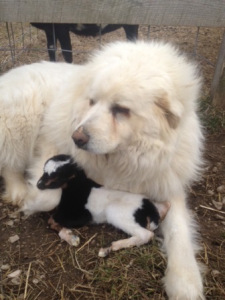
The natural areas surrounding Windshadow Farm allow for migration of coyotes and fisher through a marsh extending from the Black River. Two Great Pyrenees livestock guardian dogs are with the dairy herd at all times, and vulnerable animals are gathered within a secured dry lot at night. “The bonding [between the dogs and the goats] is incredible,” says Ron, noting that one newborn kid snuggled up with one of the dogs, Libby, when it became separated from its mother.
Ronald and Suzanne enjoy identifying the multiple species of turtles, frogs, toads and snakes found on the property and regularly see egrets, herons, and sandhill cranes, along with a host a raptors. Instead of draining seasonally-wet areas, the farm has developed a management intensive grazing system around them. “We maintain a grassed perimeter around our pastures and time our hay crop and grazing to protect ground-nesting birds and capture rain water,” says Ron. Ron and Suzanne believe they are seeing an increase in native pollinators due to their careful management and efforts to work with nature. The return of pollinators, along with more amphibians and reptiles, are signs of a healthy ecosystem on Windshadow Farm.
“We’re trying to farm as environmentally responsibly as we can,” says Ron. From the use of solar power to heat the dairy parlor’s water and to run the farm’s Polaris, Windshadow Farm considers its responsibility to future generations integral to its work. “Third-party recognition as Certified Wildlife Friendly® is important to our farm,” says Ron. “It provides a goal for us based on standards and knowledge. More importantly, it is recognition that legitimizes to our community what we all need to do in order to have a decent world for our grandkids and beyond.”
In addition to its Wildlife Friendly® certification, Windshadow Farm & Dairy is certified for its high-welfare animal care by the Animal Welfare Approved program. The farm is also a Michigan Grade A Dairy and certified for Livestock, Homestead and Cropping under the Michigan Agricultural Environmental Assurance Program. Further, Ron and Suzanne also serve on the board of directors of the Michigan Land Trustees, an organization that has promoted local food, small farms, and rural revitalization since 1976.
##
About Windshadow Farm
Windshadow Farm raises and milks a herd of pasture-raised Lamancha, Alpine, Nubian, Saanen dairy goats under the watchful eyes of 2 resident Great Pyrenees livestock guardian dogs. The farm operates in partnership with Evergreen Lane Creamery. Evergreen Lane Artisan Cheese from Windshadow Farm’s quality milk can be found throughout Western Michigan, at the Evergreen Farm tasting room in Fennville, MI, and in Chicago. For more information, see Evergreen Lane Farm & Creamery or call (269) 599-0467.
About Wildlife Friendly Enterprise Network
The Wildlife Friendly Enterprise Network and its Certified Wildlife Friendly®and Predator Friendly® programs represent farmers, ranchers, artisans and conservation heroes from around the world. Participating farms in North America maintain and enhance wildlife habitats and employ a mix of careful observation and proactive practices to allow wildlife and livestock to coexist.
Certified Wildlife Friendly® products contribute to the conservation of over twelve million hectares of diverse wetlands, forests, and grasslands; protect keystone endangered species in North America, Africa, Asia and Latin America, including wolves, elephants, cheetahs, spectacled bears and snow leopard, and benefit over 200,000 people through increased food security, income and employment. For more information visit: WildlifeFriendly
Contact: Julie Stein: Julie@wildlifefriendly.org

FOR IMMEDIATE RELEASE
WILLIAMSBURG, KY (September 9, 2015) Running an 8-acre farm near the 700,000 acre Daniel Boone National Forest, one of the most rugged areas in South Central Kentucky, Greg Sims and his wife, Cathy don’t mind the idea of sharing a little of his bounty with wild neighbors. Yet, he is careful to ensure his small flock of laying hens, young goats and bee hives do not become easy prey for area wildlife.
“If there are critters around, we’ve got them,” notes Greg. The Daniel Boone Forest is home to black bear, bobcats and coyotes, along with several endangered bat species.
Greg has a made a number of adaptations to ensure predators don’t get an easy meal from his farm, despite being open to wildlife passage and having 4 acres of woods. He uses a highly-secure shed to house his chickens and goats at night. And, he and his dogs are a frequent presence around the farm throughout the day when the animals are out on pasture.
To protect the coop against hawks, Greg zig-zagged nylon cord above the run, strung with old compact disks, which glint in the sun and rotate in the breeze. While abundant on the property, “I haven’t had a hawk come near the coop in almost 3 years” says Greg. A heavy door and secure opening mechanism keep out possums, raccoons, and foxes, among other potential visitors.
Cuddle Coop Farms achieved Certified Wildlife Friendly® status for its proactive attention to coexistence with wildlife. With dairy goats and honey bees as recent additions to the farm, electric fence and motion detector lights may soon join the Cuddle Coop’s mix of practices. Even more than honey, the pupae, larvae and eggs can serve as a strong attractant to bears. So far, Greg has found that keeping his livestock secure is both good stewardship and a good investment.
“I’ve always been an outdoors guy,” says Greg, mindful that not too many retired individuals take on the labor of farming as a later-life career. With a market garden dedicated to heirloom vegetables, home-canned products and specialty baked goods prepared by Greg’s wife, Cathy, as regular offerings at 3 weekly farmer’s markets, the Sims family has to fit relaxation into a demanding lifestyle. Greg expects goat’s milk and bee products to become a prominent addition to offerings as his livestock mature.
As a transplant from New Jersey, Greg understands the luxury of having a nearest neighbor one-half mile down the road and elbow room for people and wildlife. “New Jersey was called the Garden State for a reason,” he said. With so many family farms in northeast having been converted to housing, Greg is delighted to be surrounded by public land and neighboring farms: “I’m an old marine vet, exploring something I always thought I might want to do.
##
About Cuddle Coop Farms
Cuddle Coop Farms is a family farm in Eastern Kentucky that produces eggs from heritage Black & Lavender English Orpington, Brahma, and Wyandotte hens, along with heirloom vegetables, baked goods, and canned goods including vegetables, salsa, jams, jellies. The farm also offers Jersey Style Dirty Dogs (hot dogs) at 3 farmer’s markets per week. Now Certified Wildlife Friendly® for its land management practices, the farm is run by a retired Marine Corps Veteran and his wife. Cuddle Coop Farms is also certified as Kentucky Proud, Appalachian Proud and Homegrown By Heroes. For more information, visit Cuddle Coop Farms on Facebook.
About Wildlife Friendly Enterprise Network
The Wildlife Friendly Enterprise Network and its Certified Wildlife Friendly® and Predator Friendly® programs represent farmers, ranchers, artisans and conservation heroes from around the world. Participating farms in North America maintain and enhance wildlife habitats and employ a mix of careful observation and proactive practices to allow wildlife and livestock to coexist.
Certified Wildlife Friendly® products contribute to the conservation of over twelve million hectares of diverse wetlands, forests, and grasslands; protect keystone endangered species in North America, Africa, Asia and Latin America, including wolves, elephants, cheetahs, spectacled bears and snow leopard, and benefit over 200,000 people through increased food security, income and employment. For more information visit: www.wildlifefriendly.org
FOR IMMEDIATE RELEASE
Chianti Cashmere Goat Farm earns Wildlife Friendly® Certification for Coexisting with Wolves
Radda in Chianti, Italy: – 02 Dec 2014 – The Wildlife Friendly Enterprise Network (WFEN), a global community dedicated to supporting products that conserve threatened wildlife and contribute to economic vitality in rural landscapes, is pleased to announce the awarding of Wildlife Friendly® Certification to Chianti Cashmere Goat Farm a sustainable luxury cashmere operation in the Tuscany region of Italy which raises cashmere goats while using predator-friendly tools to coexist with wolves.
“We applaud the patience, hard work and investment that producers like Chianti Cashmere have made in order to coexist with a keystone predator like wolves. By awarding our certification label which recognizes the use of non-lethal farming and herding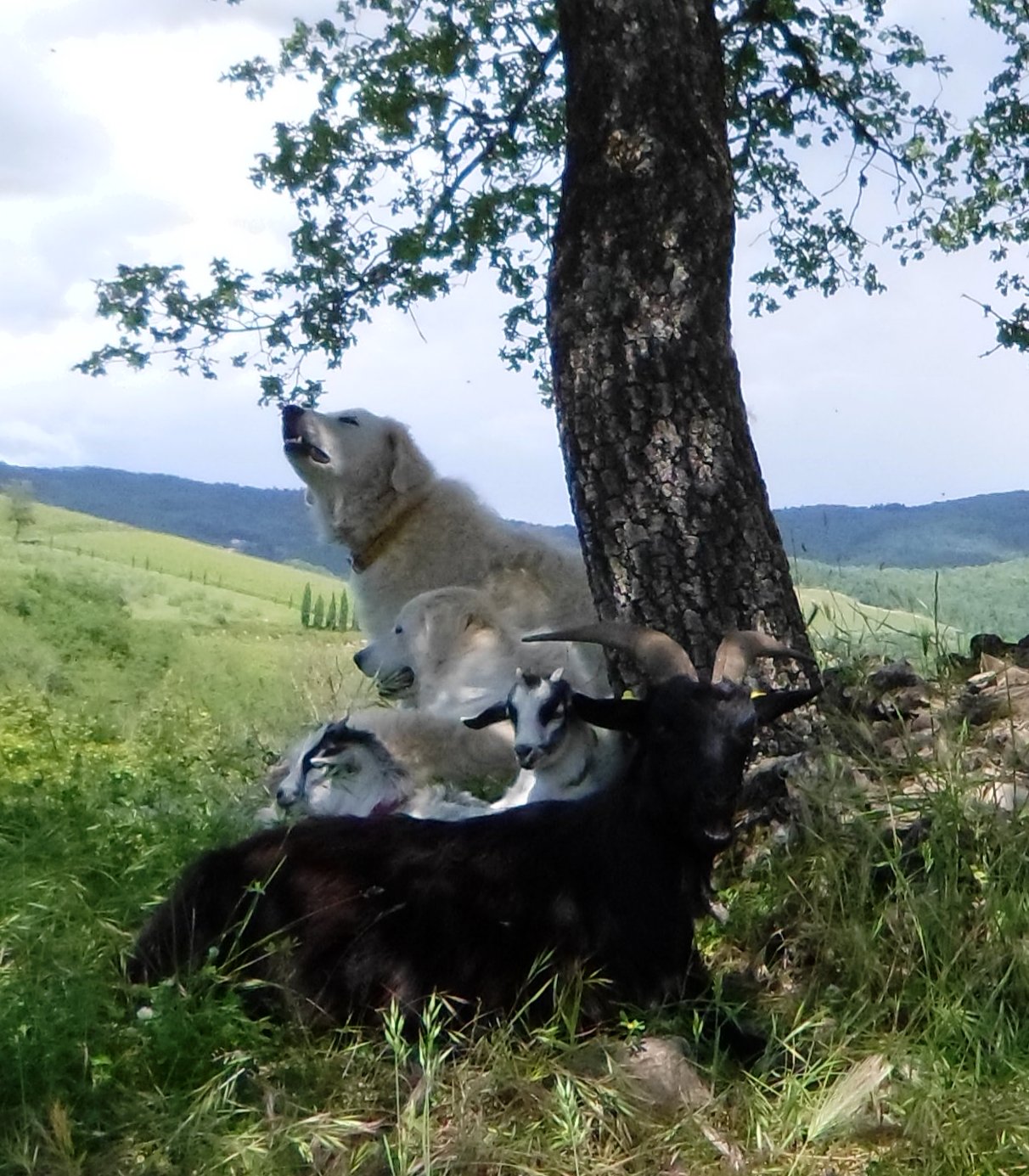
Predator-friendly practices used by Chianti Cashmere include employing a dozen Abruzzo guard dogs for their herd of 250 Cashmere Goats, an ancient breed of shepherd dog raised for centuries in southern Italy, to protect against wolves and bears.
Dr. Nora Kravis, the founder and owner of Chianti Cashmere, is also working with Dr. Duccio Berzi, a technical advisor for the non-profit Italian group Canislupus Italia, towards the selection and implementation of preventative and non-lethal anti-predator solutions with the goal of making the farm a model for Best Management Practices (BMP) to spread predator-friendly know-how and certification to other Italian herders.
In addition, Dr. Kravis is an expert on pastoralism and cashmere goat genetics, with degrees in both Veterinary Medicine and Textile Design, and is a regular participant and convener of workshops on related subjects internationally, and on the farm itself which is an agritourism destination for tourists as well as a center for the transfer of best practices to breeders and herders.
Chianti’s goat herd, which produces the raw material for a unique line of exclusive, locally processed Italian cashmere yarn, accessories and home textiles, originated in 1995 with the importing of the first cashmere goats into Italy, and improved over time by careful cross-breeding with local goats to create an Italian cashmere goat.
“We are delighted to have earned Wildlife Friendly® certification and to be recognized for our sustainability practices as well as to connect with consumers and companies who appreciate our efforts to coexist with wolves and other wildlife here in Italy” said Dr. Kravis.
Dr. Luigi Boitani, Professor of Conservation Biology at the University of Rome and widely considered to be one of the world’s leading authorities on wolves, explains “Wolves are recovering and expanding in many European countries and conflicts with humans are widespread and often difficult to manage. As a consequence wolves are vulnerable. This Wildlife Friendly® certification is extremely important for farmers across Europe showing them that coexistence is possible and recognizing and showcasing success stories for farmers using predator-friendly practices.” Read more »
FOR IMMEDIATE RELEASE
Madrone Coast Farm First in California to Achieve Certified Wildlife Friendly® Status for coexistence with Mountain Lions
Madrone Coast Farm of Felton, CA Provides Habitat for Pumas
FELTON, CA (October 28 2014) Madrone Coast Farm is the first farm in California to achieve Certified Wildlife Friendly® status in recognition of its wildlife stewardship practices, following an ISO-compliant third-party audit process. “We feel that coexistence with wildlife, including mountain lions, is very important to the health of the local ecosystem. Farmers and ranchers can successfully use proactive practices to coexist with predators,” says farmer Alison Charter-Smith.
Charter-Smith and her husband, Tony Jaehnichen, raise heritage chickens, ducks, goats, sheep, and pigs, and offer pasture-raised chicken and duck-eggs, pork and wool at 4 farmer’s markets throughout the Santa Cruz area. The vast majority of their farm is wooded and accessible to wildlife, including 3 juvenile mountain lions seen on the farm this past summer. In addition to maintaining ponds to provide water, Charter-Smith and Jaehnichen are working to increase the habitat value of their land for terrestrial and avian visitors alike. The farm has nesting boxes for swallows, bats, owls and bees. Black-tailed deer, coyotes and bobcats are also in the vicinity.
To keep stock safe, Madrone Coast Farm keeps a close eye on its animals, especially at vulnerable periods, such as lambing, corrals stock at night, and engages the help of a pair of Maremma livestock guardian dogs. “I feel great knowing my food purchases support wildlife,” says Madrone Coast customer Bonnie Doran. “It’s important to me to know the food I’m eating is not adversely impacting the ecosystem. I was raised to respect the wildlife that have always been here and belong. We need to coexist with native species, not to kill them off.”
“The Certified Wildlife Friendly® label helps consumers to vote with their pocketbooks. Consumers can now support free-ranging wildlife as they buy from local farms,” says Julie Stein, Executive Director of the global Wildlife Friendly Enterprise Network. Certified Wildlife Friendly® farms and ranches support wildlife, biodiversity, and a host of ecosystem services. Read more »
FOR IMMEDIATE RELEASE
Wildlife Friendly Enterprise Network Welcomes FIRST Founding Corporate Network Member, GREATERGOOD
GreaterGood to Showcase and Support Wildlife Friendly® Products That Help People and the Planet
BOSTON – Jan. 28, 2014 – Wildlife Friendly Enterprise Network (WFEN), a global community dedicated to supporting products that conserve threatened wildlife and contribute to rural economic vitality, is pleased to announce that GreaterGood®, a family of online activism sites and its non-profit partner GreaterGood.org are its first Founding Corporate members. As a founding member, GreaterGood will work with WFEN and its global network of experts to promote wildlife conservation through facilitation and certification of responsible production practices, enterprise development, education, branding and retail.
“We are thrilled to welcome GreaterGood as our first-ever Founding Corporate Member,” said Julie Stein Executive Director of WFEN. “Its family of charitable giving sites and the ‘Gifts That Give More’ program are the perfect venue for reaching consumers who want their purchases to create social and environmental change.”
By working together to showcase the work of the growing number of Wildlife Friendly® enterprises to buyers and the consumer public, GreaterGood will support efforts to grow the market for products developed with sound practices, enabling enterprises to succeed for the benefit of both people and ecosystems.
“As a Founding Corporate Member, GreaterGood is ready to help the Wildlife Friendly Enterprise Network expand its reach and impact with our resources and community of ethically-minded consumers,” says Tim Kunin, CEO of GreaterGood. “We strongly support its mission of helping people and wildlife not only coexist, but thrive, and welcome the opportunity to further its cause.”
GreaterGood will consult on product development, help source sustainable goods, activate and maintain best practices for biodiversity and business, and build Wildlife Friendly® value chains. GreaterGood will also feature Certified Wildlife Friendly® and Predator Friendly® products on two of its charitable giving sites, The Animal Rescue Site and The Rainforest Site. Read more »
FOR IMMEDIATE RELEASE
Ayrshire Farm is the First Farm in Virginia to Gain
Predator Friendly® Certification
UPPERVILLE, Va., Aug. 28, 2013 – Ayrshire Farm and The Wildlife Friendly Enterprise Network are pleased to announce that Ayrshire Farm is the first farm in the Commonwealth of Virginia to be certified as Predator Friendly®. Predator Friendly® recognizes best practices for wildlife stewardship on farm and ranch lands.
Ayrshire Farm, a recognized leader in the world of sustainable agriculture and one of the first farms in Virginia to achieve certified organic and Certified Humane® status, has recently gained Predator Friendly® certification under an independent audit system through a unique partnership with Animal Welfare Approved and its audit team. Ayrshire’s Predator Friendly® certified beef, rose veal, pork, chicken, eggs, and honey are available online (www.ayrshirefarm.com) and from the Home Farm Store in Middleburg, Va. Many of these products can also be found on the menu at Hunter’s Head Tavern in Upperville, Va. as well as restaurants throughout the Washington, D.C. metropolitan area.
Predator Friendly® Certified farms strive to learn about area ecology and wildlife and value the ability of their operations to serve as habitat for wildlife, including carnivores and other key species. Carnivores sighted on Ayrshire Farm include bobcats, bears, coyotes, bald eagles, and hawks. Through use of proactive, humane practices, and by ensuring streams, ponds, and other important habitat are accessible, Ayrshire Farm makes it possible for wildlife to coexist with livestock on private agricultural lands. Careful observation and adaptive management of on‐the‐ground practices in response to changing conditions are essential for success. Read more »
For Immediate Release
FIRST FARM IN U.S. GAINS DUAL TOP ANIMAL WELFARE & WILDLIFE FRIENDLY CERTIFICATIONS
Living Earth Farm in Eugene, Ore. Uses
Sustainable Agriculture Practices to Coexist with Wildlife
EUGENE, ORE. (August 5, 2013) – Sharon Blick of Living Earth Farm is the first farmer in the U.S. to achieve dual certification from both Animal Welfare Approved and Certified Wildlife Friendly™ for her flock of laying hens, meat birds, and herd of dairy goats.
The Certified Wildlife Friendly™ program is designed to assess and reward farmers and ranchers across the U.S. and Canada who coexist with native predator and wildlife species. Blick participated in a third-party audit, carried out by an Animal Welfare Approved auditor, to demonstrate compliance with the specific standards. As a result, Living Earth Farm products can now be marketed using the Certified Wildlife Friendly™ logo.
As well as gaining Certified Wildlife Friendly™ accreditation, Blick also achieved Animal Welfare Approved certification, an accolade only granted to family farmers with the keenest attention to animal welfare and environmental management on their farms. Called a “badge of honor for farmers” and the “gold standard,” this certification and food label lets consumers know that the animals were raised in accordance with the highest animal welfare standards in the U.S., using sustainable agriculture methods on an independent family farm. Read more »
Farmers and ranchers taking steps to coexist with some of our most important native predator species will benefit from a new third‐party audited certification program audited by Animal Welfare Approved (AWA), designed specifically to assess as well as reward wildlife conservation practices achieved at the farm or ranch level.
Following a three‐year partnership project with Predator Friendly1, and the Wildlife Friendly Enterprise Network (which has now subsumed the Predator Friendly® label under its global umbrella), AWA, widely recognized as the most trusted food label when it comes to animal welfare and sustainablefarming, is proud to announce the development of the “Certified Wildlife Friendly™” program, which incorporates comprehensive standards and third‐party auditing procedures to assess key wildlife conservation practices on farms and ranches across the U.S. and Canada.

